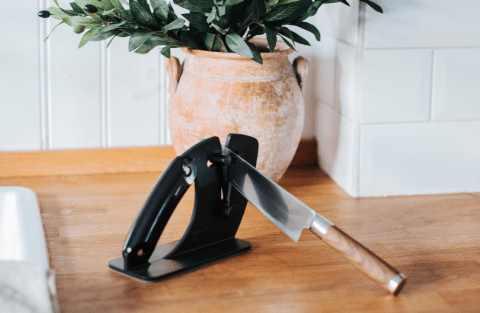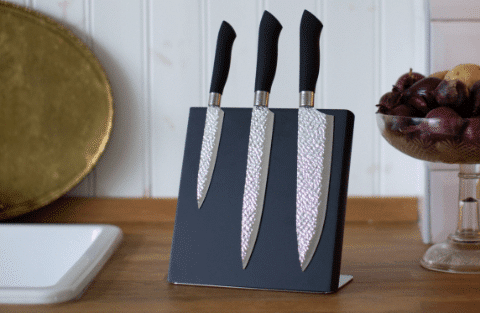Starts your knives becoming dull and slow to cut with? Then it might be time for a sharpening. Well-sharpened and sharp kitchen knives is the chef's best friend and an indispensable tool in the kitchen. Avoiding the use of a dull knife can make cooking both more efficient, safer, and more enjoyable. So let's take a closer look at how you can sharpen knives at home, and how to take care of them in the best way. We have the answers to the most common questions about knife care!
Which sharpening tool should be used to sharpen kitchen knives?
There are a lot of different methods for how to sharpen knives, but one thing that everyone has in common is that you need to have a good grinding tools. Today you can choose between several different options such as sharpen knife with slipsten, which is perfect for steel knives. Sharpening steel, on the other hand, is a better choice when you want sharpen knives In ceramics to maintain and achieve the correct angle on the edge. These are available in the materials ceramic whetstone, diamond whetstone, and steel whetstone. Knife sharpener is another sharpening tool that is very easy to use and perfect for sharpen knife at home. Just make sure that the knife sharpener fits the type of knife you intend to sharpen.
How do you sharpen a knife with a knife sharpener?
Now that you are familiar with different grinding tools, the next question is: How to use a knife sharpener? As we mentioned earlier, the knife sharpener is a practical and user-friendly tool for maintaining the sharpness of the knife. To sharpen with a knife sharpener, you can follow these steps:
- Place the knife sharpener on a flat and stable surface.
- Hold the knife with the blade perpendicular to the sharpening stone.
- Pull the knife along the stone with a light pressure and maintain the same angle throughout the stroke.
- Repeat this on both sides of the sheet until you have achieved the desired sharpness.
The most common mistakes are pulling too few times, using too much force, not sharpen the knife at the right angle or change the angle, which can result in an uneven and dull blade. But by regularly sharpen the kitchen knife With proper use of the knife sharpener, you will be able to keep your knives sharp and ready for culinary adventures.
How often should you sharpen knives?
How often you should sharpen your knives depends on how frequently you use them. Generally, it is recommended that you sharpen your knives regularly to maintain their sharpness and efficiency. A knife that is used daily or several times a week should therefore be sharpened about every two weeks, or once a month, depending on how hard it is used. If you notice that the knife no longer cuts through food easily, or if you see clear signs of wear, such as chips on the blade, then it is time for a sharpening. Sharpening the knives often and as a preventive measure will extend their lifespan and keep them in top condition for all cooking sessions.

How to store kitchen knives?
It is not just the knife sharpening that keeps the knives sharp. It is at least equally important to store kitchen knives in the right way because correct knife storage can make a big difference. By investing in a practical and stylish knife block you get good storage that helps protect your knives, while also reducing the risk of accidents. Today there are several different storage solutions where you can choose from everything from knife block to store your knives on the kitchen counter, knife holder there the knives are attached to a stand with a magnet, or knife list or knife magnet as you put on the wall in the kitchen. Another good tip is to place the knives in a separate knife box to separate them from other kitchen utensils and cutlery and thus avoid the blades wearing down unnecessarily. If this is not possible, we recommend using knife protection to avoid accidental damage and protect the blades in the box.
Why shouldn't you wash knives in the dishwasher?
Yes, why do knives become dull in the dishwasher? actually? We know that dish knives in dishwasher can be tempting due to convenience, but it can unfortunately quickly shorten the lifespan of the knives and degrade their sharpness. There are several reasons why one should avoid washing knives in the dishwasher. One reason is that the knives can be exposed to hard shocks and rubbing against other utensils and plates in the dishwasher, which can lead to the blade becoming dull and damaged. Dishwashers also use strong chemicals and high temperatures when cleaning that negatively affects the knife's properties and materials over time. If the knife also has small scratches or damage on the blade, the dishwasher's humid environment can lead to rust formation.

What knives do you need?
Now that you know how to take care of your knives properly, it's time to take a look at which different models are good to have on hand in the kitchen. Choosing the right knives for your cooking is of course crucial for performing various tasks smoothly and efficiently. Here are some basic and good kitchen knives as you should consider having in your kitchen:
- Chef's knife: A versatile and large kitchen knife with a wide blade used for chopping, slicing, and dicing vegetables, meat, and fish.
- Bread knifeA knife with a serrated or jagged blade that makes it easy to cut bread and pastries without them crumbling.
- Peeling knife: Är en small kitchen knife with a short blade used for peeling and carving smaller fruits and vegetables.
- Filékniv: A narrow and flexible knife that is perfect for filleting fish and removing the skin from meat.
- Boning knifeA knife with a flexible blade used to remove bones from meat.
In addition to these basic knives, you can expand your collection with more special and exclusive kitchen knives which are tailored for even more specific tasks. The above knives, however, cover most needs in the kitchen. At Dorre you will also find good knife set to get a complete collection for your kitchen!
NOTE! Also, don't forget to never cut with the knives on anything other than cutting boards in wood or plastic. Other surfaces will wear down and damage your kitchen knives.


